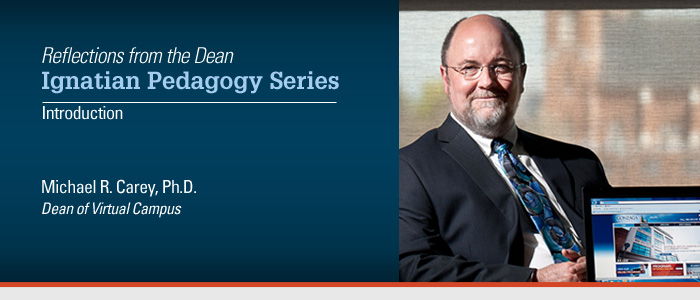This new series of blogs is meant to provide brief introduction to the five key dynamics of Ignatian Pedagogy: Context, Experience, Reflection, Action, and Evaluation.
Dr. Michael Carey is Dean of the Virtual Campus at Gonzaga University, and his doctoral dissertation included research on both Jesuit traditions and Ignatian pedagogy.
_____________________________________________________________________________________________
Nearly 500 years ago, Ignatius of Loyola had a series of profound transformational experiences, triggered when a French cannon ball shattered his leg during the defense of the Spanish city of Pamplona. During a year-long convalescence at his home in Loyola, and then throughout his journeys through Europe and the Middle East, Ignatius developed and perfected a method to facilitate profound transformation in others. The method was described in a work that has become known as the Spiritual Exercises. The essence of this method is three connected dynamics: Experience, Reflection, and Action. That is, What is my experience? Then, What is the meaning of my experience? And finally, What must I now do as a result?
Experience, Reflection, and Action. When the Society of Jesus—the religious order of men that Ignatius helped to found—created their first school in Messina, Sicily in 1548, they drew on this Ignatian method of Experience, Reflection, and Action in developing their pedagogy. To us in the 21st century, Experience, Reflection, and Action seems logical for any approach to transformational learning, but in 16th century Europe, this was something new.
In Ignatian Pedagogy, Experience refers to data perceived by the learner cognitively or responded to affectively. It might be an experience that the teacher creates for the learner, or it might be an experience that the learner recalls from his or her past actions.
Reflection on this experience means that the learner delves deeper into the meaning of the experience: Why did it turn out the way it did? Why did I feel the way I did? How do other people deal with these same experiences? How does my way of making sense of this compare to theirs?
Action refers to the fact that for the learner, transformation cannot be limited to only the head and the heart, but it must extend to the will, and therefore to action. That is, to say, what my critical thinking and experience compel me to do leads me into action. This new action then becomes a new experience, and the process of Ignatian Pedagogy begins again.
In future presentations, I will share some additional thoughts on each of these dynamics as well as two other aspects of Ignatian Pedagogy: Context and Evaluation.
Dr. Michael Carey
